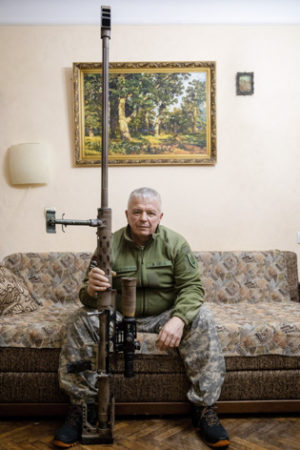It seems many of the blog topics I’ve written about over all these years seem to “connect the dots” and lead to Ian Fleming, author of the James Blond series [refer to blogs, Cynthia: World War II Mata Hari (click here), James Bond’s Lover (click here), Explosive Rats (click here), Agent Jack, “M” and the Fifth Column (click here), The Double Cross System (click here)]. Today’s topic is yet another story that has Mr. Fleming’s fingerprints all over it.
Did You Know?
Did you know it’s likely every war has its stories of elite snipers? You would if you had read several of my blogs, Lady Death (click here to read) and/or Valkoinen kuolema (click here to read). Well, the recent conflict in the Ukraine is no different. One of Ukraine’s premier military groups is their sniper division. Although snipers alone will never win a war, they can certainly help affect the outcome. That is why Ukraine’s snipers concentrate on taking out Russia’s officers. Once a Russian officer is killed, the unit he or she commanded is left without any leadership and the soldiers become disorganized and demoralized. (In the U.S. Army, noncommissioned officers would take up leadership positions in these situations.)
One of Ukraine’s sniper teams is named “Devils and Angels.” Their orders are to kill senior Russian officers and other high-profile targets. Teams of two operate in areas of extreme danger, often cut off completely from their units. One member will be a spotter, calculating distance, air humidity and temperature, and wind speed while the other handles the rifle. At night, they take turns sleeping. Ukraine claims one of their snipers took out their target at a distance of about 12,470 feet, or one third longer than the Golden Gate Bridge. It surpassed the current record by some 850 feet (I haven’t verified sniper records). Reportedly, the shot was recorded and reviewed by the Wall Street Journal.
Once his spotter had made the critical measurements and whispered, “You can,” Vyacheslav Kovalskiy pulled the trigger and waited nine seconds for the bullet to descend 330 feet to strike a Russian officer. Gun and sniper experts believe that after a distance of about 4,300 feet, a kill from a sniper’s gun is more luck than anything else.

https://www.wsj.com/world/europe/ukrainian-sniper-breaks-cover-to-claim-world-record-hit-of-more-than-2-miles-2b1c820e
What did Napoléon say when asked if he wanted good generals? He said, “No, I want lucky generals.”
Let’s Meet Ian Fleming
Ian Fleming (1908−1964) was born into a wealthy and politically prominent family. Educated at Eaton College and the Royal Military College, Sandhurst, Fleming began writing at an early age and was the editor of Eaton’s magazine, The Wyvern. Following the educational phase of his life, Fleming embarked on a series of jobs including editing and reporting for the Reuters News Agency, banking positions, and financial investments (the latter two he failed at). He also became involved in multiple affairs with one resulting in a marriage proposal that was abruptly ended after Fleming’s mother threatened to cut her son out of the family will. (Fleming may have been an unsuccessful banker and stockbroker but he was certainly pragmatic.) In early 1939, Fleming accepted a job offer that would provide a basis for his future books.
The Admiralty
Rear Admiral John Godfrey (1888−1970) was the director of British Naval Intelligence Division (NID) prior to the start of World War II. Godfrey approached Fleming and persuaded him to join the intelligence unit as his personal assistant. Less than a month before the war began, Fleming reported for duty at the Admiralty Building (a.k.a. the Ripley Building) and was given the codename “17F.” Read More No. 30 Commando
